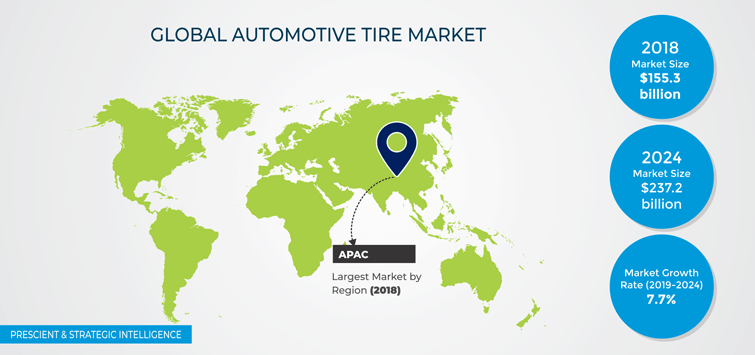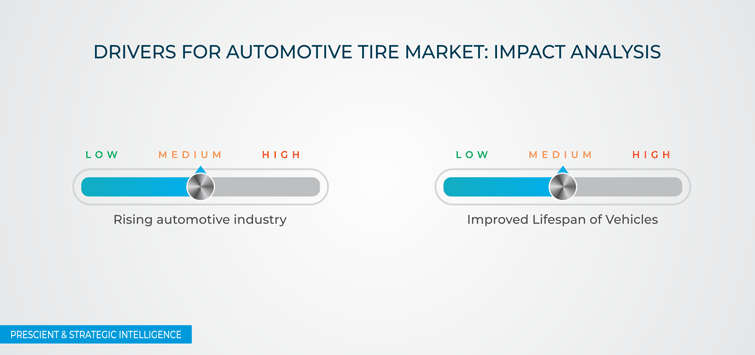Report Code: 11734 | Available Format: PDF | Pages: 158
Automotive Tire Market Research Report: By Vehicle (Two-Wheelers, Passenger Cars, Light Commercial Vehicles, Medium and Heavy Commercial Vehicles), Design (Radial, Bias), End-Use (OEM, Aftermarket), Geographical Outlook (U.S., Canada, Germany, France, Italty, Spain, U.K., Poland, Netherlands, Belgium, Switzerland, Austria, China, Japan, India, South Korea, Indonesia, Thailand, Vietnam, Australia, Malaysia, Taiwan, Brazil, Mexico) - Global Industry Analysis and Forecast to 2024
- Report Code: 11734
- Available Format: PDF
- Pages: 158
- Report Description
- Table of Contents
- Market Segmentation
- Request Free Sample
The global automotive tire market registered revenue of 155.3 billion in 2018, which is expected to reach 237.2 billion by 2024, with a CAGR of 7.7% during the forecast period. Moreover, the market registered total sale of 1,866.7 million units in 2018, and is expected to expand with a CAGR of 7.7% during the forecast period to reach 2,894.4 million units by 2024.
Globally, the APAC automotive tire market registered the fastest growth during the historical period and is expected to grow at a significant rate during the forecast period as well. The market in the region is primarily driven by increasing automobile production, rising gross domestic product (GDP), and increasing disposable income of people in emerging economies, such as China and India.

Factors Governing Automotive Tire Market
Growing popularity of next-generation, high-performance tires is one of the major trends witnessed in the automotive tire market. High-performance tires are progressively gaining popularity among automakers and players, especially in the aftermarket. These are fuel-efficient and low-noise tires, which have been conventionally used in luxury passenger cars. However, in recent years, they are being used in premium sport utility vehicles (SUVs) and crossover utility vehicles (CUVs). In addition, the development of ultra-high-performance tires resulted in increasing the overall speed and reliability of the tires. A high-performance tire can sustain a speed up to 270 km/h on an average, while an ultra-high-performance tire can sustain a speed of 299 km/h. These tires are more suitable for driving over rough terrains and for traveling longer distances, due to their higher durability over other tires.
The growing lifespan of vehicles is acting as a major driver for the growth of the automotive tire market. In the recent past, due to various technological developments, the average lifespan of vehicles had significantly increased from 10.5 years in 2010 to 12 years in 2018. Growing competition among automakers and rising government regulations have directed to the improvement of the vehicles’ durability and reliability over the years. Further, with the increasing number of mileages offered by the vehicles, the chances of wear and tear of tires have amplified, thereby causing the need to replace the tires more frequently. Thus, the growing average lifespan of the vehicles, is driving the growth of the automotive tires, in the recent years.

Private labeling provides enormous growth opportunities to tire manufacturers in the automotive tire market. Private labeling primarily refers to tire production by one company, followed by their sales under another company’s brand name. Tire manufacturers are increasingly focusing on private labeling to meet the increasing demand for their products and optimize their bottom-line profits. Few OEMs also maximize their production capacity by adding private labeling to their operations, which are carried out under the supervision of experts with extensive experience in manufacturing. This enables them to focus on management of their brand without concerning about manufacturing operation-related issues.
Automotive Tire Market Segmentation Analysis
Based on vehicle, the passenger cars category accounted for the largest share, both in terms of value and volume, in 2018, in the automotive tire market. This is attributed to the growing sales of passenger cars across the world, along with rising disposable income. Moreover, the growing sale of the passenger cars is leading to the increased demand for automotive tires. Further, the growing demand for SUVs and CUVs across the world, in recent years, is further expected to drive the demand for tires in this category.
On the basis of design, the automotive tire market is dominated by radial tires, owing to their long-lasting ability than bias tires. This is because of the superior construction of the radial tires that comprises perpendicular polyester plies and crisscrossed steel belts, which enhance the durability of the tires.
In terms of end use, the demand for automotive tires in the aftermarket has been more significant than their demand by OEMs. This is buoyed by the fact that with the improvement in vehicle lifespan, there is an increase in the number of tire replacements required within a vehicle’s lifespan.
Global Scenario of Automotive tire Market
Globally, APAC holds the largest market share, in both value and volume terms, followed by North America and Europe. China has the largest automotive industry in the world, with over 27.8 million vehicles production in 2018. Thereby, with the boom in vehicle production, the adjacent tire market witnessed rapid growth in recent years. The Chinese tire market has been witnessing a steady growth, mainly due to the country’s economic growth and steady growth in OEM tire sales. Whereas, Thailand is the fastest growing market for automotive tires in the APAC region, and the country is a source of more than 35% of the world’s raw rubber, which is a major component of tire. Other factors such as steady increase in vehicle production and rising demand for automotive tires in the aftermarket in these regions will boost the overall growth of the automotive tire market.
(1).png)
Competitive Landscape of the Automotive Tire Market
The global automotive tire market was consolidated in nature, with the top four players accounted for around 45% of the global sales in 2018. The Compagnie Générale des Établissements Michelin was the leader, mainly due to the company’s heavy investment, coupled with growing presence of large dealer network across the globe. It was closely followed by Bridgestone Corporation. Other major players operating in the market are The Goodyear Tire & Rubber Company, Continental AG, Sumitomo Rubber Industries Limited, Pirelli & C. S.p.A., Hankook Tire Company Limited, and The Yokohama Rubber Company Limited.
Recent Strategic Developments of Major Automotive Tire Players
In recent years, the major players in the automotive tire market have taken several strategic measures, such as product launches, mergers and acquisitions, and facility expansions, to gain a competitive edge in the industry. For instance, in June 2019, Kumho Tire Co. Inc. introduced four new products for the Chinese vehicle market during an event in Nanjing, China. The products ranged from new premium Majesty9 model to performance tires for SUVs. Further, in April 2019, Continental Tire the Americas LLC announced the expansion of its production facility in Sumter, South Carolina, to bring new technologies to its tire production in North America. The expansion included the addition of 29,000-square-foot manufacturing space to the facility.
Key Questions Addressed/Answered in the Report
- What is the current scenario of the global automotive tire market?
- What are the emerging technologies for the development of the market?
- What is the present size of the market segments and their future potential?
- What are the existing regulations on tire in different countries across various regions in the world?
- What are the major catalysts for the market and their impact during the short, medium, and long terms?
- What are the evolving opportunities for the players in the market?
- Which are the key regions from the investment perspective?
- What are the key strategies being adopted by the major players to expand their market share?
- What are the market shares of the major players operating in the market?
During 2019–2024, the automotive tire market will witness a CAGR of 7.7% in terms of volume as well as value.
In 2024, the automotive tire industry is expected to register sales of 2,894.4 million units.
The radial design would have the brighter future in the automotive tire market.
Most of the sales in the automotive tire industry are registered in APAC.
The automotive tire market is consolidated, as an over 45% share was held by four players in 2018.
Want a report tailored exactly to your business strategy?
Request CustomizationWant an insight-rich discussion with the report author?
Speak to AnalystOur dedication to providing the most-accurate market information has earned us verification by Dun & Bradstreet (D&B). We strive for quality checking of the highest level to enable data-driven decision making for you
Our insights into the minutest levels of the markets, including the latest trends and competitive landscape, give you all the answers you need to take your business to new heights
With 24/7 research support, we ensure that the wheels of your business never stop turning. Don’t let time stand in your way. Get all your queries answered with a simple phone call or email, as and when required
We take a cautious approach to protecting your personal and confidential information. Trust is the strongest bond that connects us and our clients, and trust we build by complying with all international and domestic data protection and privacy laws